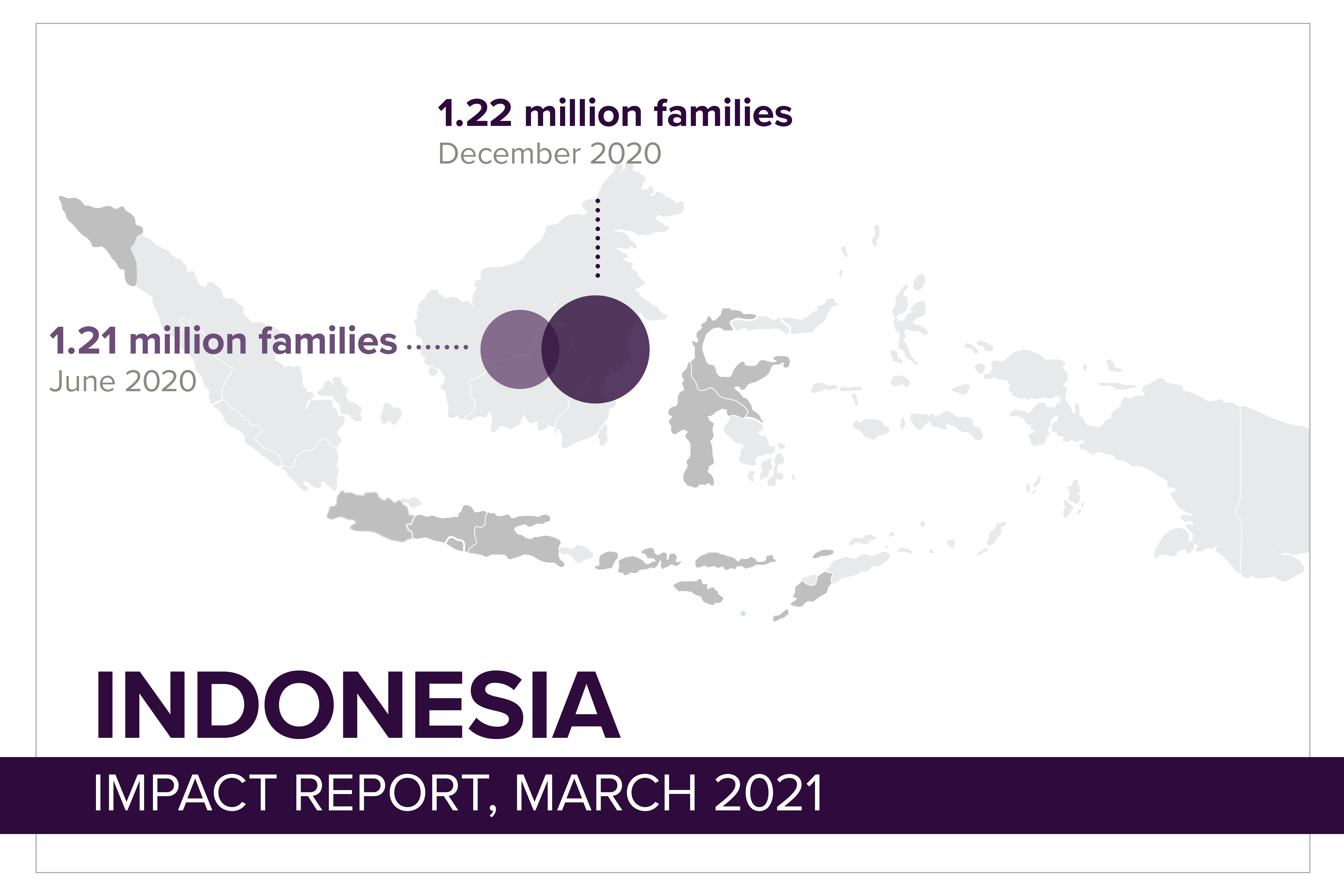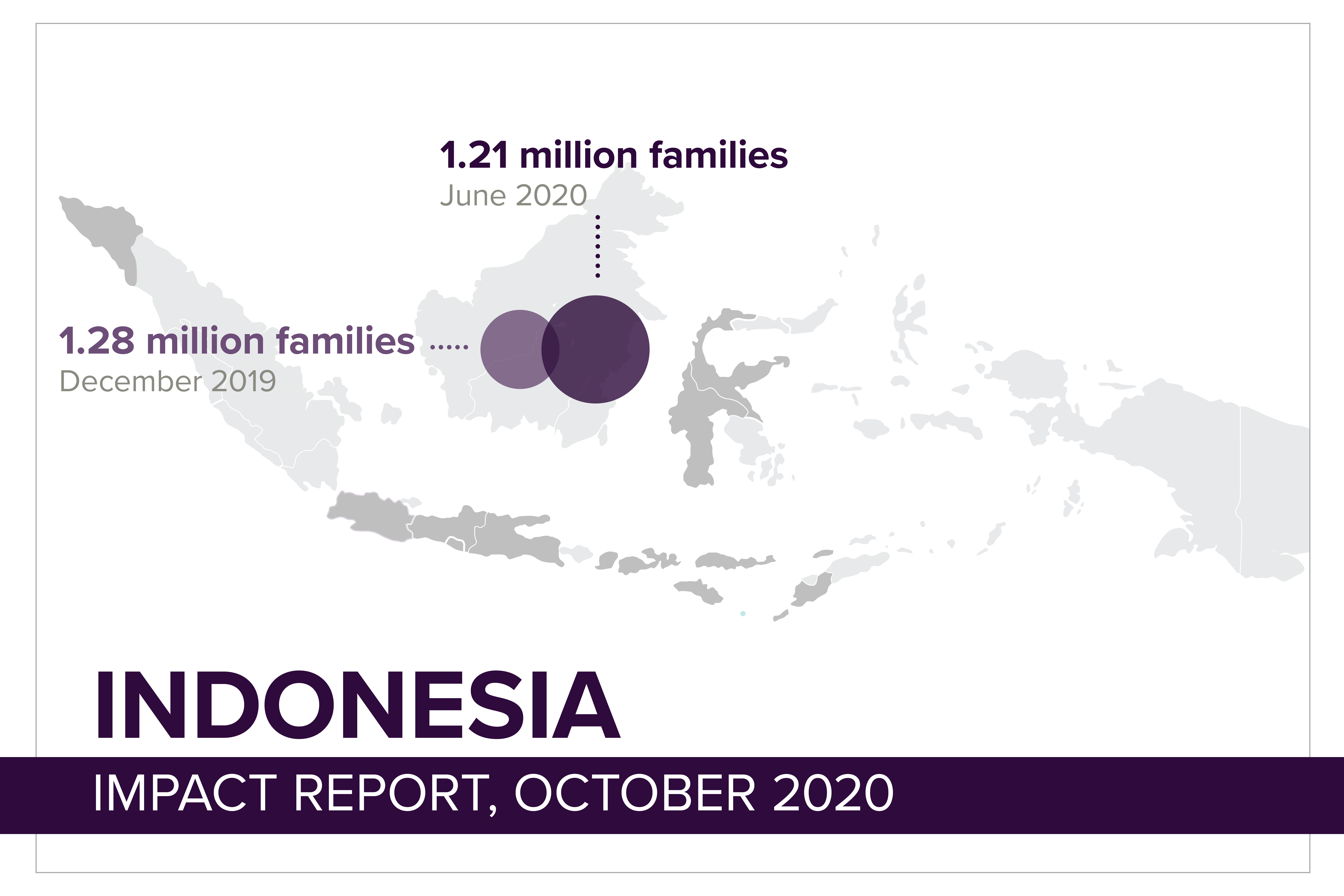Data to December 2020.
*Understand portfolio at risk and operational sustainability
Voice from the program
Starting a new life with microfinance
When Retno Suratmi’s husband passed away 10 years ago, she became a single mother to the couple’s eight children, with few resources to feed her family. Whilst it would seem prudent to have fewer children if money is tight, many people living in poverty have large families because they fear losing children to illness; they also rely on their children to support them in their old age.
Today, the team at Opportunity’s partner KOMIDA call Retno a wonder woman – in addition to running a business, she’s the head of her loan group and a trained Health Leader. Joining the group, “a milieu of understanding, kindness and comfort,” as she calls it, was key to building her future."
Retno, who originally wanted to be a teacher, runs a street stall selling drinks and snacks. She works hard and before COVID-19 was making up to IDR350,000 (about A$30) a day. That plummeted to between A$3 and A$6 once the pandemic hit, but Retno is resilient. She worked even harder, from 6.00am to 5.00pm every day, and added new products to generate increased sales. KOMIDA allowed her to reduce her repayments and that kept her afloat.
Paying it forward
As a trained Health Leader, her understanding of health protocols has helped her family and community remain free of COVID-19 and she’s managed to see five of her children through school since her husband died. The youngest three are still studying and Retno also acts as adoptive mother to the street kids who live near her stall.
“I’m an ordinary woman who opens up her hand to share and care for whoever needs it. I hope for prosperity for all my children, wherever they are,” Retno says. “The happiness of the soul is always the key.” A wonder woman indeed.

Ibu Retno Suratmi (left, with a KOMIDA Field Officer) used microloans to build a snack and drink business after her husband died. She has housed and fed her eight children, five of whom have now graduated from high school, while three are still studying.
Strategic direction
With the onslaught of the COVID-19 pandemic, Opportunity’s partners in Indonesia quickly found ways to support their microfinance clients. The first step was to provide loan repayment moratoriums ranging from two weeks to three months. Then it became clear that accurate, medically-sound information about COVID-19 was in short supply. Opportunity’s partners stepped into the breach, using every means they could – phone and video calls to group leaders and visits by loans officers – to inform clients about what COVID-19 was and how to avoid catching it. Partners also provided clients with health supplies, disinfectants, personal protective equipment and food, often paid for by donations from the partners’ staff. Flexible staffing arrangements were implemented to keep staff and clients safe.
Then came the massive task of assessing every client’s business and situation, as well as making adjustments to products and services to ensure that clients had adequate cashflow to pay for the resources they required.
In 2020, all of Opportunity’s partners in Indonesia were piloting the use of phone and tablet technology to facilitate the provision of financial services for people living in poverty, including digital lending and saving, as well as automating information collection. While the COVID-19 pandemic interrupted many of the pilots’ planned activities, partners ran tests on sharing health awareness campaigns through social media (Facebook and WhatsApp) which proved effective for disseminating health information related to preventing the spread of the virus.
Typically, microfinance clients interact with Opportunity’s partners face-to-face, so digital engagement is a new way of doing things. To get insights into clients’ current digital literacy levels, one of Opportunity’s partners in Indonesia tested how effective it would be to contact clients through WhatsApp to encourage them to market their products and services in an online platform.
Using the phone numbers from their database, Opportunity’s partner sent WhatsApp messages encouraging clients to access a buying and selling group set up on Facebook. When fewer than 10 per cent of clients responded to the message, they decided that significant face-to-face discussions would still be needed to help their clients understand the benefits of interacting with digital platforms.
Opportunity’s partners also recognise the need to find the right balance between using technology and maintaining strong personal relationships: many clients do not have access to phones and clients across all Opportunity’s partners report that they receive significant support from meeting in groups and with the loan officers.
Partner performance

Opportunity’s microfinance partners in Indonesia have all demonstrated their resilience during the global pandemic. They have done extremely well to maintain the number of families they serve since the start of the pandemic, and are working to rebuild back to December 2019 levels (1.28m Dec 2019). COVID-19 continues to be a real risk in Indonesia with infection rates rising throughout the first few months of 2021. Opportunity is focusing on assisting partners to stabilise their operations, and is providing assistance and capital to help clients restart businesses. This also includes redesigning loans to meet clients’ specific needs as they emerge from the pandemic.
Long term relationships with 1.2 million families provide us with significant insights into the many challenges they face. Opportunity is encouraging an increased focus on building partnerships with government and private sector organisations to help our clients and their families overcome challenges associated with accessing resources such as health, education and markets for their goods.
Opportunity’s newest microfinance partner in Indonesia, YCAB, has had an extremely turbulent time. They are relatively inexperienced and operate in the higher-density regions of Jakarta which have been hit hardest by the pandemic. Opportunity has walked closely with them, assisting in rescheduling and restructuring loans along with the restructuring of their branch model. As a result, YCAB has closed or consolidated 12 branches, an initiative Opportunity believes is critical in their return to growth and sustainability.
Partner summary
| Families Reached | Loans Outstanding A$'000 | Operational Sustainability | Portfolio at Risk >30 days | |
|---|---|---|---|---|
| KOMIDA | 740,393 | $147,367 | 100.01% | 3.12% |
| BAV | 344,517 | $98,187 | 107% | 6% |
| TLM Co-operative | 113,811 | $16,697 | 108.9% | 1.92% |
| YCAB | 24,298 | $2,011 | N/A | 43% |
| Overall | 1,223,019 | $264,263 | 101% | 4.47% |
Data from December 2020
* Portfolio at risk (PAR) is a stringent measure of a microfinance institution’s loan portfolio quality. The portfolio at risk calculates the total value of outstanding loan balances for loans, for every payment that is overdue by more than 30 days. Operational self-sustainability (OSS) is the ability of an organisation to cover the costs of its lending program with the revenue earned from its lending program.
Case study
High tech approach to close the digital divide
Opportunity focuses on low-cost, efficient ways to extend financial services to rural communities, for example through mobile banking which allows women to transact anywhere, at any time, with a basic phone. Opportunity’s digital financial inclusion program focuses on women because they often lag behind men in accessing technologies and using digital services, including digital financial services. Across low- and middle-income countries, women are eight per cent less likely than men to own a mobile phone and 20 per cent less likely to use mobile internet.1
With a focus on barriers and challenges disproportionately affecting women, Opportunity is working to close the global digital gender gap. In Asia, the main barriers to women using mobile internet include literacy and digital skills, affordability, and a perceived lack of relevance. By facilitating mobile-based digital literacy skills training for women, providing microloans to women to cover the cost of smartphones, and developing the apps and services that meet the needs of women, Opportunity’s partners can address these barriers directly to improve outreach to women clients.2
Automated digital processes that will help clients to engage with Opportunity’s partners include paperless credit evaluation and identification verification, as well as channels for providing information about available products and services. From the microfinance institutions’ point of view, digitisation promises increased efficiency, such as providing a centralised repository of data related to clients that can be used to better serve them.
This project is supported by the Australian Government through the Australian NGO Cooperation Program (ANCP).
1 GSMA The Mobile Gender Gap Report 2020 pg 2
2 GSMA The Mobile Gender Gap Report 2020 pg 33
Impact Stories
Your support is empowering these women—and millions more like them—to create a new future for their families, free from poverty.

“I only wish my children could finish high school.”
– Marce, Rote Island
Marce makes and sells cakes, as well as fish she catches along the beach, to provide for her family.

"I hope my children can now be successful."
– Oktavin, Rote Island
A savvy business idea and a small loan helped Oktavin start a grilled fish business that quadrupled her family's income.

“Sometimes when we get a small harvest, I give some to my son to eat."
– Heni, Rote Island
Heni part owns a community garden which provides her family with fresh food and addtional income.

“I wish I can do the best for her (my daughter)."
– Marta, Oebelo
Marta's salt business is growing and her family is working hard to break the poverty cycle.

